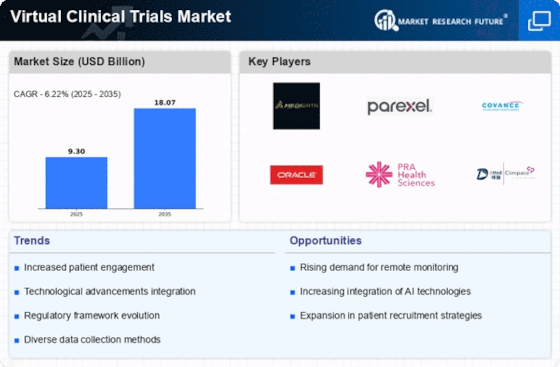Interventional Trials
Observational Trials
Registry Trials
Diagnostic Trials
Wearable Technology
Mobile Health Applications
Telemedicine Platforms
Blockchain Technology
Oncology
Cardiology
Neurology
Infectious Diseases
Endocrinology
Direct to Patient
Doctor Referrals
Online Platforms
Patient Registries
North America
Europe
South America
Asia Pacific
Middle East and Africa
North America Outlook (USD Billion, 2019-2035)
North America Virtual Clinical Trials Market by Study Design Type
Interventional Trials
Observational Trials
Registry Trials
Diagnostic Trials
North America Virtual Clinical Trials Market by Technology Type
Wearable Technology
Mobile Health Applications
Telemedicine Platforms
Blockchain Technology
North America Virtual Clinical Trials Market by Therapeutic Area Type
Oncology
Cardiology
Neurology
Infectious Diseases
Endocrinology
North America Virtual Clinical Trials Market by Participant Recruitment Type
Direct to Patient
Doctor Referrals
Online Platforms
Patient Registries
North America Virtual Clinical Trials Market by Regional Type
US
Canada
US Outlook (USD Billion, 2019-2035)
US Virtual Clinical Trials Market by Study Design Type
Interventional Trials
Observational Trials
Registry Trials
Diagnostic Trials
US Virtual Clinical Trials Market by Technology Type
Wearable Technology
Mobile Health Applications
Telemedicine Platforms
Blockchain Technology
US Virtual Clinical Trials Market by Therapeutic Area Type
Oncology
Cardiology
Neurology
Infectious Diseases
Endocrinology
US Virtual Clinical Trials Market by Participant Recruitment Type
Direct to Patient
Doctor Referrals
Online Platforms
Patient Registries
CANADA Outlook (USD Billion, 2019-2035)
CANADA Virtual Clinical Trials Market by Study Design Type
Interventional Trials
Observational Trials
Registry Trials
Diagnostic Trials
CANADA Virtual Clinical Trials Market by Technology Type
Wearable Technology
Mobile Health Applications
Telemedicine Platforms
Blockchain Technology
CANADA Virtual Clinical Trials Market by Therapeutic Area Type
Oncology
Cardiology
Neurology
Infectious Diseases
Endocrinology
CANADA Virtual Clinical Trials Market by Participant Recruitment Type
Direct to Patient
Doctor Referrals
Online Platforms
Patient Registries
Europe Outlook (USD Billion, 2019-2035)
Europe Virtual Clinical Trials Market by Study Design Type
Interventional Trials
Observational Trials
Registry Trials
Diagnostic Trials
Europe Virtual Clinical Trials Market by Technology Type
Wearable Technology
Mobile Health Applications
Telemedicine Platforms
Blockchain Technology
Europe Virtual Clinical Trials Market by Therapeutic Area Type
Oncology
Cardiology
Neurology
Infectious Diseases
Endocrinology
Europe Virtual Clinical Trials Market by Participant Recruitment Type
Direct to Patient
Doctor Referrals
Online Platforms
Patient Registries
Europe Virtual Clinical Trials Market by Regional Type
Germany
UK
France
Russia
Italy
Spain
Rest of Europe
GERMANY Outlook (USD Billion, 2019-2035)
GERMANY Virtual Clinical Trials Market by Study Design Type
Interventional Trials
Observational Trials
Registry Trials
Diagnostic Trials
GERMANY Virtual Clinical Trials Market by Technology Type
Wearable Technology
Mobile Health Applications
Telemedicine Platforms
Blockchain Technology
GERMANY Virtual Clinical Trials Market by Therapeutic Area Type
Oncology
Cardiology
Neurology
Infectious Diseases
Endocrinology
GERMANY Virtual Clinical Trials Market by Participant Recruitment Type
Direct to Patient
Doctor Referrals
Online Platforms
Patient Registries
UK Outlook (USD Billion, 2019-2035)
UK Virtual Clinical Trials Market by Study Design Type
Interventional Trials
Observational Trials
Registry Trials
Diagnostic Trials
UK Virtual Clinical Trials Market by Technology Type
Wearable Technology
Mobile Health Applications
Telemedicine Platforms
Blockchain Technology
UK Virtual Clinical Trials Market by Therapeutic Area Type
Oncology
Cardiology
Neurology
Infectious Diseases
Endocrinology
UK Virtual Clinical Trials Market by Participant Recruitment Type
Direct to Patient
Doctor Referrals
Online Platforms
Patient Registries
FRANCE Outlook (USD Billion, 2019-2035)
FRANCE Virtual Clinical Trials Market by Study Design Type
Interventional Trials
Observational Trials
Registry Trials
Diagnostic Trials
FRANCE Virtual Clinical Trials Market by Technology Type
Wearable Technology
Mobile Health Applications
Telemedicine Platforms
Blockchain Technology
FRANCE Virtual Clinical Trials Market by Therapeutic Area Type
Oncology
Cardiology
Neurology
Infectious Diseases
Endocrinology
FRANCE Virtual Clinical Trials Market by Participant Recruitment Type
Direct to Patient
Doctor Referrals
Online Platforms
Patient Registries
RUSSIA Outlook (USD Billion, 2019-2035)
RUSSIA Virtual Clinical Trials Market by Study Design Type
Interventional Trials
Observational Trials
Registry Trials
Diagnostic Trials
RUSSIA Virtual Clinical Trials Market by Technology Type
Wearable Technology
Mobile Health Applications
Telemedicine Platforms
Blockchain Technology
RUSSIA Virtual Clinical Trials Market by Therapeutic Area Type
Oncology
Cardiology
Neurology
Infectious Diseases
Endocrinology
RUSSIA Virtual Clinical Trials Market by Participant Recruitment Type
Direct to Patient
Doctor Referrals
Online Platforms
Patient Registries
ITALY Outlook (USD Billion, 2019-2035)
ITALY Virtual Clinical Trials Market by Study Design Type
Interventional Trials
Observational Trials
Registry Trials
Diagnostic Trials
ITALY Virtual Clinical Trials Market by Technology Type
Wearable Technology
Mobile Health Applications
Telemedicine Platforms
Blockchain Technology
ITALY Virtual Clinical Trials Market by Therapeutic Area Type
Oncology
Cardiology
Neurology
Infectious Diseases
Endocrinology
ITALY Virtual Clinical Trials Market by Participant Recruitment Type
Direct to Patient
Doctor Referrals
Online Platforms
Patient Registries
SPAIN Outlook (USD Billion, 2019-2035)
SPAIN Virtual Clinical Trials Market by Study Design Type
Interventional Trials
Observational Trials
Registry Trials
Diagnostic Trials
SPAIN Virtual Clinical Trials Market by Technology Type
Wearable Technology
Mobile Health Applications
Telemedicine Platforms
Blockchain Technology
SPAIN Virtual Clinical Trials Market by Therapeutic Area Type
Oncology
Cardiology
Neurology
Infectious Diseases
Endocrinology
SPAIN Virtual Clinical Trials Market by Participant Recruitment Type
Direct to Patient
Doctor Referrals
Online Platforms
Patient Registries
REST OF EUROPE Outlook (USD Billion, 2019-2035)
REST OF EUROPE Virtual Clinical Trials Market by Study Design Type
Interventional Trials
Observational Trials
Registry Trials
Diagnostic Trials
REST OF EUROPE Virtual Clinical Trials Market by Technology Type
Wearable Technology
Mobile Health Applications
Telemedicine Platforms
Blockchain Technology
REST OF EUROPE Virtual Clinical Trials Market by Therapeutic Area Type
Oncology
Cardiology
Neurology
Infectious Diseases
Endocrinology
REST OF EUROPE Virtual Clinical Trials Market by Participant Recruitment Type
Direct to Patient
Doctor Referrals
Online Platforms
Patient Registries
APAC Outlook (USD Billion, 2019-2035)
APAC Virtual Clinical Trials Market by Study Design Type
Interventional Trials
Observational Trials
Registry Trials
Diagnostic Trials
APAC Virtual Clinical Trials Market by Technology Type
Wearable Technology
Mobile Health Applications
Telemedicine Platforms
Blockchain Technology
APAC Virtual Clinical Trials Market by Therapeutic Area Type
Oncology
Cardiology
Neurology
Infectious Diseases
Endocrinology
APAC Virtual Clinical Trials Market by Participant Recruitment Type
Direct to Patient
Doctor Referrals
Online Platforms
Patient Registries
APAC Virtual Clinical Trials Market by Regional Type
China
India
Japan
South Korea
Malaysia
Thailand
Indonesia
Rest of APAC
CHINA Outlook (USD Billion, 2019-2035)
CHINA Virtual Clinical Trials Market by Study Design Type
Interventional Trials
Observational Trials
Registry Trials
Diagnostic Trials
CHINA Virtual Clinical Trials Market by Technology Type
Wearable Technology
Mobile Health Applications
Telemedicine Platforms
Blockchain Technology
CHINA Virtual Clinical Trials Market by Therapeutic Area Type
Oncology
Cardiology
Neurology
Infectious Diseases
Endocrinology
CHINA Virtual Clinical Trials Market by Participant Recruitment Type
Direct to Patient
Doctor Referrals
Online Platforms
Patient Registries
INDIA Outlook (USD Billion, 2019-2035)
INDIA Virtual Clinical Trials Market by Study Design Type
Interventional Trials
Observational Trials
Registry Trials
Diagnostic Trials
INDIA Virtual Clinical Trials Market by Technology Type
Wearable Technology
Mobile Health Applications
Telemedicine Platforms
Blockchain Technology
INDIA Virtual Clinical Trials Market by Therapeutic Area Type
Oncology
Cardiology
Neurology
Infectious Diseases
Endocrinology
INDIA Virtual Clinical Trials Market by Participant Recruitment Type
Direct to Patient
Doctor Referrals
Online Platforms
Patient Registries
JAPAN Outlook (USD Billion, 2019-2035)
JAPAN Virtual Clinical Trials Market by Study Design Type
Interventional Trials
Observational Trials
Registry Trials
Diagnostic Trials
JAPAN Virtual Clinical Trials Market by Technology Type
Wearable Technology
Mobile Health Applications
Telemedicine Platforms
Blockchain Technology
JAPAN Virtual Clinical Trials Market by Therapeutic Area Type
Oncology
Cardiology
Neurology
Infectious Diseases
Endocrinology
JAPAN Virtual Clinical Trials Market by Participant Recruitment Type
Direct to Patient
Doctor Referrals
Online Platforms
Patient Registries
SOUTH KOREA Outlook (USD Billion, 2019-2035)
SOUTH KOREA Virtual Clinical Trials Market by Study Design Type
Interventional Trials
Observational Trials
Registry Trials
Diagnostic Trials
SOUTH KOREA Virtual Clinical Trials Market by Technology Type
Wearable Technology
Mobile Health Applications
Telemedicine Platforms
Blockchain Technology
SOUTH KOREA Virtual Clinical Trials Market by Therapeutic Area Type
Oncology
Cardiology
Neurology
Infectious Diseases
Endocrinology
SOUTH KOREA Virtual Clinical Trials Market by Participant Recruitment Type
Direct to Patient
Doctor Referrals
Online Platforms
Patient Registries
MALAYSIA Outlook (USD Billion, 2019-2035)
MALAYSIA Virtual Clinical Trials Market by Study Design Type
Interventional Trials
Observational Trials
Registry Trials
Diagnostic Trials
MALAYSIA Virtual Clinical Trials Market by Technology Type
Wearable Technology
Mobile Health Applications
Telemedicine Platforms
Blockchain Technology
MALAYSIA Virtual Clinical Trials Market by Therapeutic Area Type
Oncology
Cardiology
Neurology
Infectious Diseases
Endocrinology
MALAYSIA Virtual Clinical Trials Market by Participant Recruitment Type
Direct to Patient
Doctor Referrals
Online Platforms
Patient Registries
THAILAND Outlook (USD Billion, 2019-2035)
THAILAND Virtual Clinical Trials Market by Study Design Type
Interventional Trials
Observational Trials
Registry Trials
Diagnostic Trials
THAILAND Virtual Clinical Trials Market by Technology Type
Wearable Technology
Mobile Health Applications
Telemedicine Platforms
Blockchain Technology
THAILAND Virtual Clinical Trials Market by Therapeutic Area Type
Oncology
Cardiology
Neurology
Infectious Diseases
Endocrinology
THAILAND Virtual Clinical Trials Market by Participant Recruitment Type
Direct to Patient
Doctor Referrals
Online Platforms
Patient Registries
INDONESIA Outlook (USD Billion, 2019-2035)
INDONESIA Virtual Clinical Trials Market by Study Design Type
Interventional Trials
Observational Trials
Registry Trials
Diagnostic Trials
INDONESIA Virtual Clinical Trials Market by Technology Type
Wearable Technology
Mobile Health Applications
Telemedicine Platforms
Blockchain Technology
INDONESIA Virtual Clinical Trials Market by Therapeutic Area Type
Oncology
Cardiology
Neurology
Infectious Diseases
Endocrinology
INDONESIA Virtual Clinical Trials Market by Participant Recruitment Type
Direct to Patient
Doctor Referrals
Online Platforms
Patient Registries
REST OF APAC Outlook (USD Billion, 2019-2035)
REST OF APAC Virtual Clinical Trials Market by Study Design Type
Interventional Trials
Observational Trials
Registry Trials
Diagnostic Trials
REST OF APAC Virtual Clinical Trials Market by Technology Type
Wearable Technology
Mobile Health Applications
Telemedicine Platforms
Blockchain Technology
REST OF APAC Virtual Clinical Trials Market by Therapeutic Area Type
Oncology
Cardiology
Neurology
Infectious Diseases
Endocrinology
REST OF APAC Virtual Clinical Trials Market by Participant Recruitment Type
Direct to Patient
Doctor Referrals
Online Platforms
Patient Registries
South America Outlook (USD Billion, 2019-2035)
South America Virtual Clinical Trials Market by Study Design Type
Interventional Trials
Observational Trials
Registry Trials
Diagnostic Trials
South America Virtual Clinical Trials Market by Technology Type
Wearable Technology
Mobile Health Applications
Telemedicine Platforms
Blockchain Technology
South America Virtual Clinical Trials Market by Therapeutic Area Type
Oncology
Cardiology
Neurology
Infectious Diseases
Endocrinology
South America Virtual Clinical Trials Market by Participant Recruitment Type
Direct to Patient
Doctor Referrals
Online Platforms
Patient Registries
South America Virtual Clinical Trials Market by Regional Type
Brazil
Mexico
Argentina
Rest of South America
BRAZIL Outlook (USD Billion, 2019-2035)
BRAZIL Virtual Clinical Trials Market by Study Design Type
Interventional Trials
Observational Trials
Registry Trials
Diagnostic Trials
BRAZIL Virtual Clinical Trials Market by Technology Type
Wearable Technology
Mobile Health Applications
Telemedicine Platforms
Blockchain Technology
BRAZIL Virtual Clinical Trials Market by Therapeutic Area Type
Oncology
Cardiology
Neurology
Infectious Diseases
Endocrinology
BRAZIL Virtual Clinical Trials Market by Participant Recruitment Type
Direct to Patient
Doctor Referrals
Online Platforms
Patient Registries
MEXICO Outlook (USD Billion, 2019-2035)
MEXICO Virtual Clinical Trials Market by Study Design Type
Interventional Trials
Observational Trials
Registry Trials
Diagnostic Trials
MEXICO Virtual Clinical Trials Market by Technology Type
Wearable Technology
Mobile Health Applications
Telemedicine Platforms
Blockchain Technology
MEXICO Virtual Clinical Trials Market by Therapeutic Area Type
Oncology
Cardiology
Neurology
Infectious Diseases
Endocrinology
MEXICO Virtual Clinical Trials Market by Participant Recruitment Type
Direct to Patient
Doctor Referrals
Online Platforms
Patient Registries
ARGENTINA Outlook (USD Billion, 2019-2035)
ARGENTINA Virtual Clinical Trials Market by Study Design Type
Interventional Trials
Observational Trials
Registry Trials
Diagnostic Trials
ARGENTINA Virtual Clinical Trials Market by Technology Type
Wearable Technology
Mobile Health Applications
Telemedicine Platforms
Blockchain Technology
ARGENTINA Virtual Clinical Trials Market by Therapeutic Area Type
Oncology
Cardiology
Neurology
Infectious Diseases
Endocrinology
ARGENTINA Virtual Clinical Trials Market by Participant Recruitment Type
Direct to Patient
Doctor Referrals
Online Platforms
Patient Registries
REST OF SOUTH AMERICA Outlook (USD Billion, 2019-2035)
REST OF SOUTH AMERICA Virtual Clinical Trials Market by Study Design Type
Interventional Trials
Observational Trials
Registry Trials
Diagnostic Trials
REST OF SOUTH AMERICA Virtual Clinical Trials Market by Technology Type
Wearable Technology
Mobile Health Applications
Telemedicine Platforms
Blockchain Technology
REST OF SOUTH AMERICA Virtual Clinical Trials Market by Therapeutic Area Type
Oncology
Cardiology
Neurology
Infectious Diseases
Endocrinology
REST OF SOUTH AMERICA Virtual Clinical Trials Market by Participant Recruitment Type
Direct to Patient
Doctor Referrals
Online Platforms
Patient Registries
MEA Outlook (USD Billion, 2019-2035)
MEA Virtual Clinical Trials Market by Study Design Type
Interventional Trials
Observational Trials
Registry Trials
Diagnostic Trials
MEA Virtual Clinical Trials Market by Technology Type
Wearable Technology
Mobile Health Applications
Telemedicine Platforms
Blockchain Technology
MEA Virtual Clinical Trials Market by Therapeutic Area Type
Oncology
Cardiology
Neurology
Infectious Diseases
Endocrinology
MEA Virtual Clinical Trials Market by Participant Recruitment Type
Direct to Patient
Doctor Referrals
Online Platforms
Patient Registries
MEA Virtual Clinical Trials Market by Regional Type
GCC Countries
South Africa
Rest of MEA
GCC COUNTRIES Outlook (USD Billion, 2019-2035)
GCC COUNTRIES Virtual Clinical Trials Market by Study Design Type
Interventional Trials
Observational Trials
Registry Trials
Diagnostic Trials
GCC COUNTRIES Virtual Clinical Trials Market by Technology Type
Wearable Technology
Mobile Health Applications
Telemedicine Platforms
Blockchain Technology
GCC COUNTRIES Virtual Clinical Trials Market by Therapeutic Area Type
Oncology
Cardiology
Neurology
Infectious Diseases
Endocrinology
GCC COUNTRIES Virtual Clinical Trials Market by Participant Recruitment Type
Direct to Patient
Doctor Referrals
Online Platforms
Patient Registries
SOUTH AFRICA Outlook (USD Billion, 2019-2035)
SOUTH AFRICA Virtual Clinical Trials Market by Study Design Type
Interventional Trials
Observational Trials
Registry Trials
Diagnostic Trials
SOUTH AFRICA Virtual Clinical Trials Market by Technology Type
Wearable Technology
Mobile Health Applications
Telemedicine Platforms
Blockchain Technology
SOUTH AFRICA Virtual Clinical Trials Market by Therapeutic Area Type
Oncology
Cardiology
Neurology
Infectious Diseases
Endocrinology
SOUTH AFRICA Virtual Clinical Trials Market by Participant Recruitment Type
Direct to Patient
Doctor Referrals
Online Platforms
Patient Registries
REST OF MEA Outlook (USD Billion, 2019-2035)
REST OF MEA Virtual Clinical Trials Market by Study Design Type
Interventional Trials
Observational Trials
Registry Trials
Diagnostic Trials
REST OF MEA Virtual Clinical Trials Market by Technology Type
Wearable Technology
Mobile Health Applications
Telemedicine Platforms
Blockchain Technology
REST OF MEA Virtual Clinical Trials Market by Therapeutic Area Type
Oncology
Cardiology
Neurology
Infectious Diseases
Endocrinology
REST OF MEA Virtual Clinical Trials Market by Participant Recruitment Type
Direct to Patient
Doctor Referrals
Online Platforms
Patient Registries


















Leave a Comment